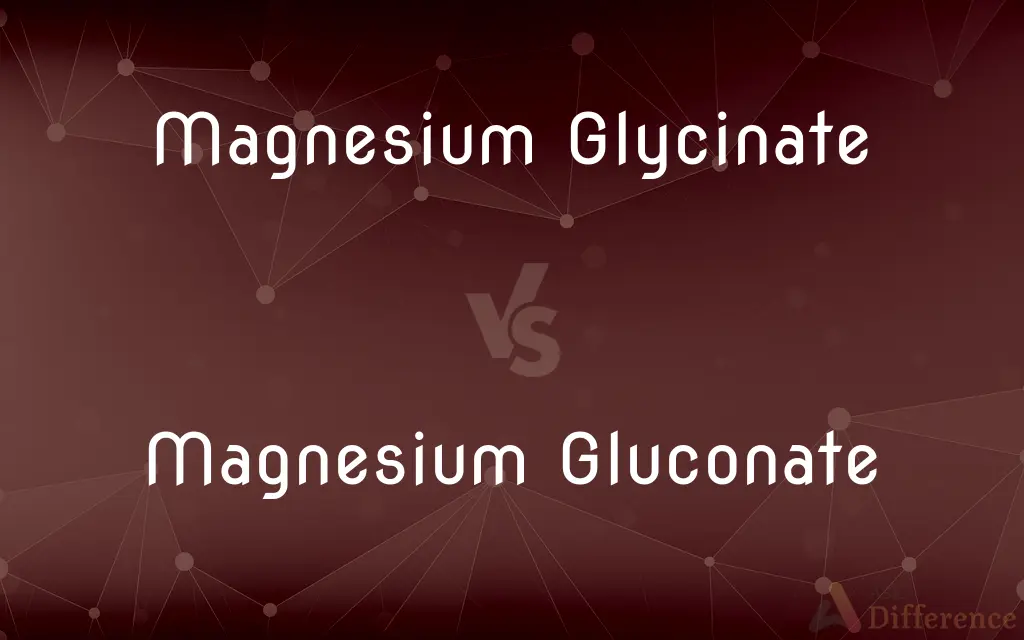Magnesium Glycinate vs. Magnesium Gluconate — What's the Difference?
By Tayyaba Rehman — Published on November 6, 2023
Magnesium Glycinate is magnesium bound to glycine and known for good absorption and gentle effects on the stomach. Magnesium Gluconate, magnesium bound to gluconic acid, is recognized for optimal bioavailability.

Difference Between Magnesium Glycinate and Magnesium Gluconate
Table of Contents
ADVERTISEMENT
Key Differences
Magnesium Glycinate, as an elemental magnesium compound bound to glycine, garners a reputation for being highly absorbable and less likely to induce gastrointestinal discomfort, thus establishing itself as a commonly utilized form in dietary supplements. The incorporation of glycine not only influences the absorption rate of magnesium but also imparts its own health implications, including support for sleep and mood stability. Consequently, Magnesium Glycinate tends to be recommended for individuals who have sensitive digestive systems or require additional glycine intake.
In contrast, Magnesium Gluconate stands as magnesium chelated to gluconic acid, maintaining its status as one of the forms of magnesium reputed for its superior bioavailability. In the context of Magnesium Gluconate, bioavailability refers to the extent to which the mineral is absorbed and utilized by the body, playing a pivotal role in its effectiveness as a supplement. It's typically suggested for those looking to replenish magnesium levels efficiently without overly taxing the digestive system.
To delve deeper into Magnesium Glycinate, it's crucial to highlight that this form, while revered for its gentleness and high absorption, may not always be the most potent magnesium source available. It aligns well with the needs of individuals who are looking to amalgamate the benefits of magnesium alongside the calming and neurological supportive actions of glycine. This formulation demonstrates how the chelated amino acid can dictate both the nutritional and therapeutic applications of the supplement.
When it comes to Magnesium Gluconate, this version of magnesium, while respected for its bioavailability, is relatively low in terms of magnesium content by weight. This entails that larger doses or larger pills/capsules might be necessary to achieve the desired magnesium intake when choosing Magnesium Gluconate, which could be a decisive factor for individuals considering dosage convenience and efficacy in their supplement selection.
Further analyzing Magnesium Glycinate and Magnesium Gluconate, the former, with its exceptional tolerance and absorption, and the latter, with its commendable bioavailability, underscore that the most suitable form of magnesium is inherently dependent on individual health objectives, sensitivities, and needs. Both variants provide valuable avenues to enhance magnesium levels while catering to distinct physiological and preferential aspects, illustrating the importance of choice in nutritional supplementation.
ADVERTISEMENT
Comparison Chart
Bound Compound
Glycine
Gluconic Acid
Key Characteristics
Gentle on stomach, supports sleep
Noted for high bioavailability
Magnesium Content
Moderate
Relatively low
Typical Uses
Sleep support, sensitive stomachs
Efficient magnesium replenishment
Pill Size/Dosage
Often smaller/standard
Can be larger to provide ample mg
Compare with Definitions
Magnesium Glycinate
Known for exceptional absorption.
People choose Magnesium Glycinate to enhance magnesium levels efficiently.
Magnesium Gluconate
May require larger doses for efficacy.
To achieve desired levels, larger doses of Magnesium Gluconate might be necessary.
Magnesium Glycinate
Less likely to cause digestive upset.
He opted for Magnesium Glycinate to avoid gastrointestinal issues.
Magnesium Gluconate
Renowned for its bioavailability.
Nutritionists appreciate Magnesium Gluconate for its notable bioavailability.
Magnesium Glycinate
A magnesium form bonded with glycine.
Magnesium Glycinate is reputed for being gentle on the digestive system.
Magnesium Gluconate
Commonly used in magnesium replenishment.
For boosting his magnesium levels, he chose Magnesium Gluconate.
Magnesium Glycinate
Can support sleep and mood.
She took Magnesium Glycinate to assist with her sleep quality.
Magnesium Gluconate
Possesses lower magnesium content.
Despite its benefits, Magnesium Gluconate has less magnesium per weight.
Magnesium Glycinate
Sometimes recommended for neurological health.
For cognitive support, Magnesium Glycinate was suggested.
Magnesium Gluconate
Chelated with gluconic acid.
Magnesium Gluconate is often recognized for optimal absorption.
Common Curiosities
Can Magnesium Glycinate assist with sleep?
Yes, it’s known to support sleep due to glycine.
How does Magnesium Gluconate impact digestion?
Generally well-tolerated with good absorption.
Why choose Magnesium Gluconate?
Noted for its high bioavailability and absorption.
Is Magnesium Glycinate suitable for sensitive stomachs?
Yes, it’s often chosen for its gastrointestinal gentleness.
What’s the magnesium content in Magnesium Gluconate?
It has a relatively low magnesium content per weight.
Will Magnesium Glycinate support neurological health?
It may, partly due to the influence of glycine.
Can I take Magnesium Glycinate daily?
Yes, it’s often taken daily but consult a healthcare provider.
What distinguishes Magnesium Glycinate from other forms?
It’s bound to glycine and gentle on the stomach.
What are the typical uses of Magnesium Gluconate?
Commonly used for magnesium replenishment and deficiency.
Can I take Magnesium Gluconate if I have kidney issues?
Consult a healthcare provider due to magnesium levels.
Is Magnesium Glycinate gluten-free?
Most are, but always verify with product labels.
Do I need larger doses of Magnesium Gluconate for efficacy?
Possibly, due to its lower magnesium content.
Can I use Magnesium Gluconate for leg cramps?
It may help, but it’s essential to consult a healthcare professional.
How do I determine the dosage for Magnesium Glycinate?
Dosages vary; consult healthcare providers for specifics.
Is Magnesium Glycinate vegan?
Usually, but check labels to confirm.
Share Your Discovery

Previous Comparison
Direct Expenses vs. Indirect Expenses
Next Comparison
Salicylates vs. NSAIDsAuthor Spotlight
Written by
Tayyaba RehmanTayyaba Rehman is a distinguished writer, currently serving as a primary contributor to askdifference.com. As a researcher in semantics and etymology, Tayyaba's passion for the complexity of languages and their distinctions has found a perfect home on the platform. Tayyaba delves into the intricacies of language, distinguishing between commonly confused words and phrases, thereby providing clarity for readers worldwide.













































